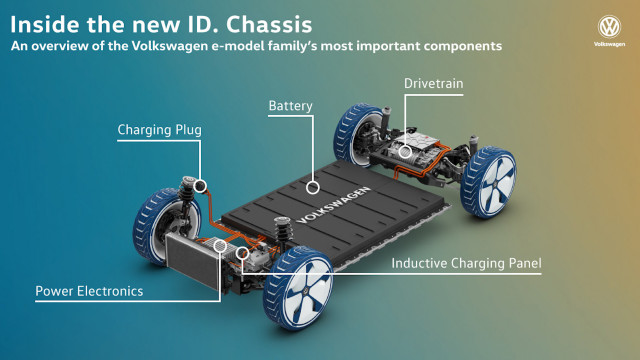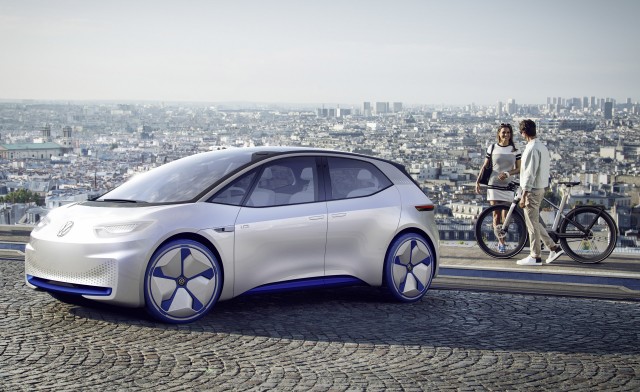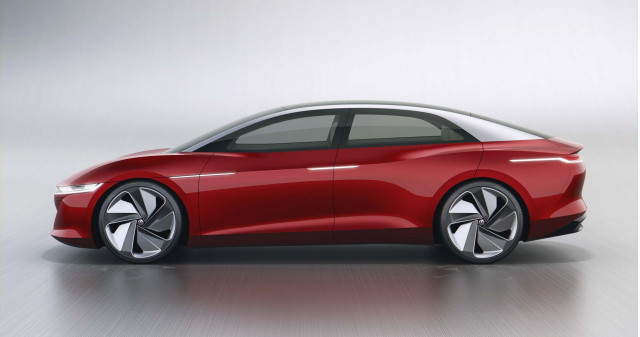Follow Bengt

VW MEB platform
Volkswagen plans to price its new generation of upcoming fully electric vehicles lower than it had previously hinted—as low as 18,000 euros for Europe, or about $21,000 for an entry-level fully electric model that will launch there in late 2019.
The news, via Reuters, comes as Volkswagen aims to make rapid changes to its manufacturing facilities. One of those plants is its Zwickau factory, targeted for a $1.4 billion transformation from building about 300,000 combustion-engine models to the same number of fully electric vehicles in 2021.
DON’T MISS: Here's the battery pack behind VW's global electric-vehicle push
The first couple of VW's new, small electric cars—the small ID hatchback in 2019 and the ID Crozz crossover in 2020—may come from Zwickau in 2019 at a slower rate, but Bloomberg reports that VW is also now targeting a plant in Emden, Germany, to build the entry-level electric model at an eventual rate of up to 200,000 per year.
The entry model will be built on the automaker’s new MEB modular electric-car underpinnings, planned for as many as 10 million cars.

Volkswagen ID electric car concept, 2016 Paris auto show
That $21,000 base price, in Germany, would land in the vicinity of a base gasoline-powered Volkswagen Golf, but it would remain thousands more than a Polo, the vehicle that’s a size smaller sold in many overseas markets.
CHECK OUT: Will Volkswagen's electric Microbus be made in the USA?
Volkswagen plans to have its more affordable MEB-based model replace the e-Golf in the lineup. We’re especially curious to see how it’s presented, priced, and sold in the U.S. next to the greenest version of the next-generation Golf, a plug-in hybrid with a longer range than the current 16 miles of all-electric range offered by the Audi A3 e-tron, which is very closely related to the overseas-only Volkswagen GTE plug-in hybrid.
VW is aiming to localize its electric-car production. It has said that at least some, if not all, of its electric vehicles sold in the U.S. will be built in the U.S., and it’s giving Chattanooga, Tennessee, where it already assembled Passat sedans and Atlas SUVs, some consideration as one of 16 key global “e-locations” for electric-car assembly.
The battery pack in this smallest MEB model is expected to be 48 kilowatt-hours—possibly equating to an EPA driving range of 175 miles or more. According to the Bloomberg report, Volkswagen may be able to offset the high price of the battery pack with a total production time that’s potentially half of a Volkswagen Golf, due to reduced complexity.
READ MORE: VW may share electric-car platform with Ford
Volkswagen hasn’t yet made an official model name known for the entry I.D., or any other model in the I.D. family for that matter. One name that’s been mentioned for the lowest-priced model is Neo, although that name hasn’t been confirmed and could remain an internal designation.
A total of 50 battery-electric models are expected from all of the VW Group’s brands by 2030. But two other models are due sooner, in 2022. One of them is the electric revival of the Microbus, called the ID Buzz in concept form, and the other is a flagship all-electric sedan, as previewed by the ID Vizzion concept, that would be more of a direct rival to Tesla, showcasing a higher level of connectivity and cabin technology.

Volkswagen ID Vizzion Concept
Either of these two later vehicles could be the vehicle that showcases the augmented-reality technology that the automaker has allowed for in the MEB platform.
The pricing news closely aligns with what executives have previously said about pricing. In September, Thomas Ulbrich, the VW Group Board of Management member in charge of e-mobility, said that the electric vehicles will be priced at the level of a comparable diesel car.
The latest pricing announcement ups the ante for other automakers, targeting a price even below that, and closer to that of a gasoline car. It’s a business model that other automakers—including Tesla—may have to eventually match.